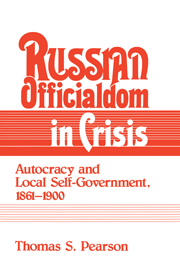Book contents
- Frontmatter
- Contents
- Preface
- Acknowledgments
- 1 Introduction: old problems, new principles – tsarist government and the Great Reforms
- 2 The birth of a new rural order: the state and local self-government, 1861–75
- 3 The breakdown of tsarist administrative order, 1875–81
- 4 The debate revived: state, social change, and ideologies of local self-government reform, 1881–5
- 5 State control over local initiative: the Land Captain Statute of 1889
- 6 The politics of the zemstvo counterreform, 1888–90
- 7 Conclusion
- Select bibliography
- Index
4 - The debate revived: state, social change, and ideologies of local self-government reform, 1881–5
Published online by Cambridge University Press: 08 October 2009
- Frontmatter
- Contents
- Preface
- Acknowledgments
- 1 Introduction: old problems, new principles – tsarist government and the Great Reforms
- 2 The birth of a new rural order: the state and local self-government, 1861–75
- 3 The breakdown of tsarist administrative order, 1875–81
- 4 The debate revived: state, social change, and ideologies of local self-government reform, 1881–5
- 5 State control over local initiative: the Land Captain Statute of 1889
- 6 The politics of the zemstvo counterreform, 1888–90
- 7 Conclusion
- Select bibliography
- Index
Summary
In its predominantly bureaucratic composition and in its method of activity, the Kakhanov Commission, established in 1881 to draft reform projects for local administration, differed little from previous legislative commissions in nineteenth-century Russia. Yet owing to recent court politics and the deepening administrative and economic crisis in the provinces, the debate in the Kakhanov Commission exhibited a fervor unusual for such bodies. The participants not only clashed over proposals to reorganize peasant and zemstvo self-government, but they used the occasion to debate issues vital to the fate of the old regime, such as the future roles of the peasantry and gentry in local administration; the feasibility of dissolving legal and political distinctions between peasants and nonpeasants and establishing a common comprehensive system of public self-government from the village level up; the type of executive agent needed at the volost' level to enforce government and zemstvo decisions; and, finally, the benefits and shortcomings of the reforms of the 1860s and their guiding concepts of public participation in local government and the separation of administrative and judicial authority. Even though commission members failed to come up with definitive answers on these matters (these issues dominated official and public discussions of reform until tsarism fell in 1917), they nevertheless agreed that in the early 1880s Imperial Russia stood at a crossroads in terms of political development and social support.
- Type
- Chapter
- Information
- Russian Officialdom in CrisisAutocracy and Local Self-Government, 1861–1900, pp. 119 - 163Publisher: Cambridge University PressPrint publication year: 1989



